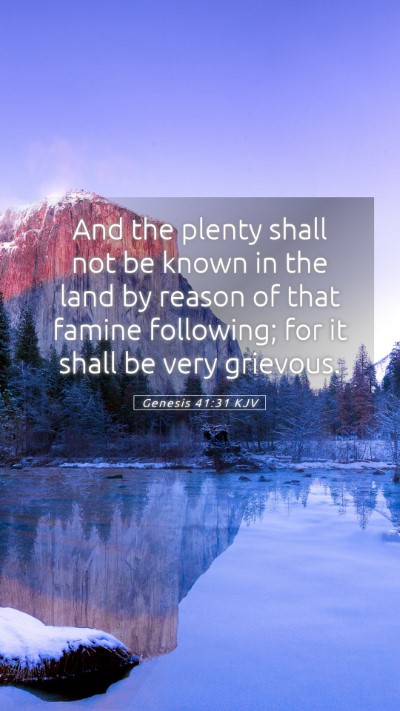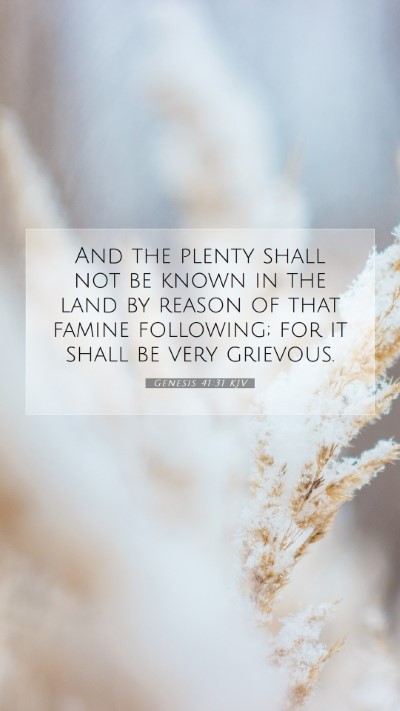Understanding Genesis 41:31
Genesis 41:31 states, "And the plenty shall not be known in the land by reason of that famine following; for it shall be very grievous." This verse is part of the narrative concerning Joseph's interpretation of Pharaoh's dreams, revealing the coming years of abundance and famine in Egypt.
Bible Verse Meanings
This scripture offers deep insights into the cyclical nature of prosperity and hardship. According to Matthew Henry, the verse emphasizes how the severity of future famine will overshadow the abundance. The text suggests a divine purpose in the economic cycles, reinforcing the idea that God controls the seasons of plenty and need.
Bible Verse Interpretations
- Albert Barnes highlights that the 'plenty' would be forgotten due to the overwhelming impact of the famine. The amnesia towards past blessings serves to remind believers about human fragility and the need for divine support.
- Adam Clarke notes that the severity of the famine is a miraculous warning from God, designed to lead people back to reliance on Him. Clarke observes that the forgetfulness in the face of crisis teaches a lesson about gratitude and awareness of God's provisions.
Bible Verse Explanations
This verse encourages believers to recognize that periods of abundance often come with a risk of complacency. The reminder of impending famine acts as an exhortation to remain prepared and faithful, as expressed by Henry.
Scripture Analysis
By contextualizing Genesis 41:31 within the broader narrative of Joseph's life, we see a clear message about the importance of discernment. The interpretation of Pharaoh's dreams serves as a pivotal moment in Egypt's history, illustrating God's sovereign plan and providence.
Biblical Exegesis
Close examination reveals that the dream is not just a forecast of future events but also serves to prepare Joseph for his role as a leader. The severity of the coming famine underlines the necessity of wise governance and stewardship, urging the reader to consider how they prepare for their own 'famine' times.
Bible Study Insights
Engaging with this verse in a bible study group setting could yield valuable discussions on personal experiences of abundance and lack, further enhancing Bible verse understanding and interpretation. Through sharing and reflection, members can explore the application of these lessons in their own lives.
Meaning of Bible Verses
Genesis 41:31 offers a blueprint for understanding the emotional and spiritual dynamics of abundance and scarcity. Recognizing that both states are temporary calls on believers to maintain a posture of humility and reliance on God.
In-depth Bible Verse Analysis
To fully grasp the implications of this verse, scholars should consider the historical context of Egypt and the agrarian society of the time. The swift transition from abundance to famine illustrates vulnerability inherent in life, prompting a reflection on broader themes of dependency and provision.
Applying Bible Verses to Daily Life
The call to not forget the plenty when faced with struggle is especially pertinent in today's fast-paced society. Recognizing the cycles in our lives, one can seek to implement practical steps during times of plenty, such as generosity and saving for future needs, informed by the insights of this scripture.
Related Bible Cross References
- Proverbs 30:25 - “The ants are a people not strong, yet they prepare their meat in the summer.” A reminder to prepare for future needs.
- Acts 11:28 - Discusses a similar prophecy of famine in the early church context.
- Matthew 6:19-21 - Encourages storing treasures in heaven, echoing themes of valuing spiritual abundance over material.
Conclusion
In summary, Genesis 41:31 serves as a profound reminder of the importance of preparation and reliance on God's goodness amidst life's uncertainties. Engaging with this scripture through various bible study resources can deepen understanding and provide assurance during times of lack.


